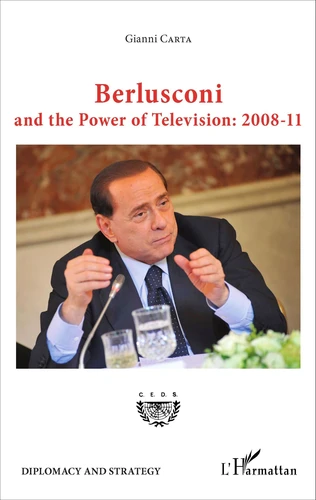Berlusconi and the Power of Television: 2008-11
Par :Formats :
Disponible dans votre compte client Decitre ou Furet du Nord dès validation de votre commande. Le format PDF est :
- Compatible avec une lecture sur My Vivlio (smartphone, tablette, ordinateur)
- Compatible avec une lecture sur liseuses Vivlio
- Pour les liseuses autres que Vivlio, vous devez utiliser le logiciel Adobe Digital Edition. Non compatible avec la lecture sur les liseuses Kindle, Remarkable et Sony
 , qui est-ce ?
, qui est-ce ?Notre partenaire de plateforme de lecture numérique où vous retrouverez l'ensemble de vos ebooks gratuitement
Pour en savoir plus sur nos ebooks, consultez notre aide en ligne ici
- Nombre de pages346
- FormatPDF
- ISBN978-2-14-000629-6
- EAN9782140006296
- Date de parution01/04/2016
- Copier Coller01 page(s) autorisée(s)
- Protection num.Digital Watermarking
- Taille4 Mo
- ÉditeurL'Harmattan
Résumé
Power and media are closely linked in any ideological political system, but Italy under three-term premier Silvio Berlusconi is a case apart. A businessman-turned-politician and owner of a vast media empire, Berlusconi became Italy's longest-serving post-war prime minister through his proficient use of television. This book examines how Berlusconi built his empire and used the media to achieve and retain political success in a milieu where allegations of corruption, bribery and links to the Mafia were constant features, and amid his own sexual scandals.
Finally, the author wonders if Berlusconi's media-driven political power is a ?model? that could be replicated in other countries.
Finally, the author wonders if Berlusconi's media-driven political power is a ?model? that could be replicated in other countries.
Power and media are closely linked in any ideological political system, but Italy under three-term premier Silvio Berlusconi is a case apart. A businessman-turned-politician and owner of a vast media empire, Berlusconi became Italy's longest-serving post-war prime minister through his proficient use of television. This book examines how Berlusconi built his empire and used the media to achieve and retain political success in a milieu where allegations of corruption, bribery and links to the Mafia were constant features, and amid his own sexual scandals.
Finally, the author wonders if Berlusconi's media-driven political power is a ?model? that could be replicated in other countries.
Finally, the author wonders if Berlusconi's media-driven political power is a ?model? that could be replicated in other countries.




